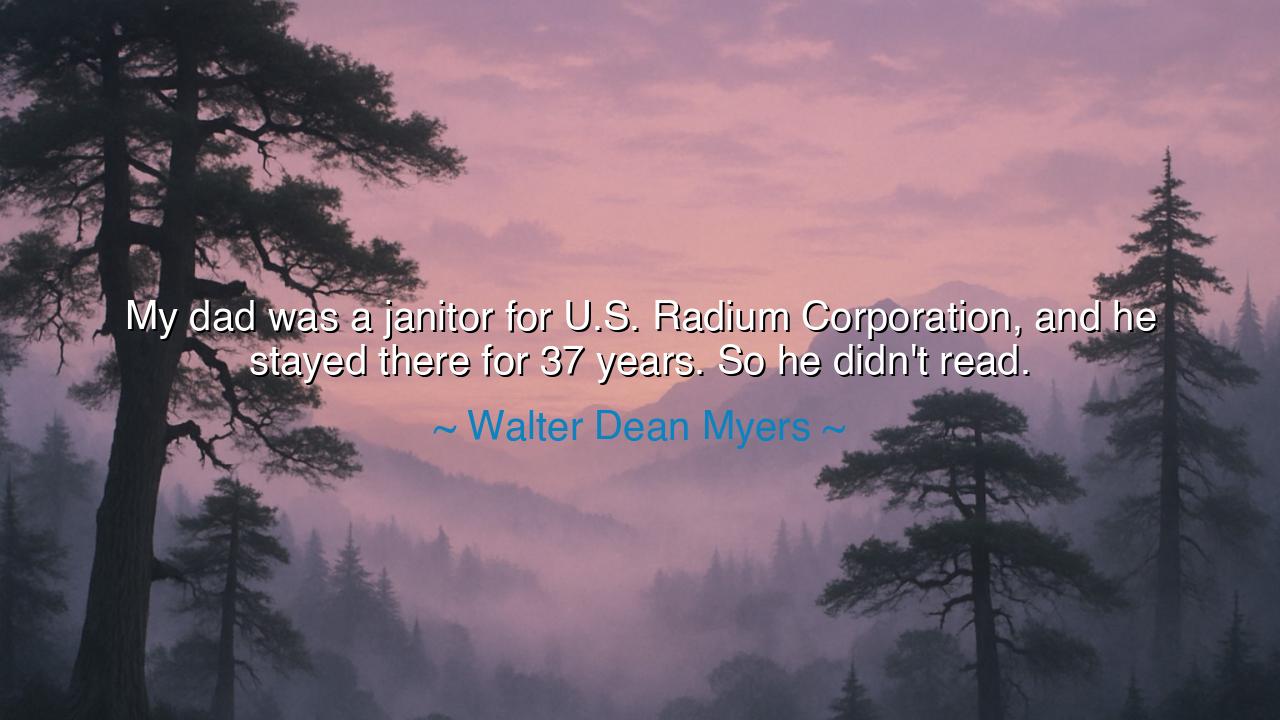
My dad was a janitor for U.S. Radium Corporation, and he stayed
My dad was a janitor for U.S. Radium Corporation, and he stayed there for 37 years. So he didn't read.






“My dad was a janitor for U.S. Radium Corporation, and he stayed there for 37 years. So he didn’t read.” Thus spoke Walter Dean Myers, the great chronicler of struggle and triumph, whose words were forged in the fire of lived truth. In this simple, solemn reflection lies a vast story—not only of one man, but of a generation. Myers does not speak in pity or boast, but in reverence. He speaks of a father who labored long in silence, a man of sweat and endurance, whose hands built what his eyes perhaps could not dream. The quote is not about the absence of reading—it is about the presence of sacrifice, the noble quiet of those who gave their strength so that others might find voice.
The U.S. Radium Corporation was no ordinary workplace; it was a symbol of an era when progress gleamed with both light and shadow. It was known for producing luminous materials, shining with promise yet filled with danger. There, Myers’ father spent thirty-seven years, his life measured not in books or words, but in toil. He may not have read the written word—but he read the rhythm of necessity, the pulse of duty. In his silence, there was a kind of literacy deeper than language: the wisdom of perseverance. The father’s world was one of endurance; the son’s world, one of expression. Yet both were bound by purpose—the father’s labor laid the ground upon which the son could rise.
There is something profoundly ancient in this truth. In every civilization, there are those who build in silence so that others may speak. The Egyptian laborer who carved the stones of temples may not have read the inscriptions that priests later chanted. The medieval stonemason who raised cathedrals may never have opened a holy text, yet his hands translated faith into form. In the same way, Myers’ father—though he did not read—was part of the same lineage. His work was not celebrated in books, yet it gave birth to one who would write them. From the father’s calloused hands came the son’s pen, from the father’s silence, the son’s song.
Myers’ words also bear the mark of gratitude. He does not look upon his father’s lack of education as a failing, but as a sacrifice offered at the altar of family. For in those thirty-seven years of service, his father gave up not only comfort, but curiosity—the luxury of reading, of dreaming beyond necessity. And yet, through his work, he gave his children the chance to dream freely. This, too, is a kind of literacy—a reading of the human condition. The man who could not read the printed page still understood the language of love, duty, and resilience.
Consider the story of Booker T. Washington, who was born into slavery and forbidden to read. Though his mother could not offer him books, she offered him determination—the hunger to learn. Washington carried her spirit into freedom and became one of the great educators of his age. The world often honors those who achieve, but forgets those whose unseen endurance made that achievement possible. Like Washington’s mother, like Myers’ father, countless men and women have lived without the light of education, yet have been the lamps that light the way for others.
The deeper meaning of Myers’ reflection is this: dignity does not depend on education, but on integrity. Reading, learning, and creation are sacred, but so is labor done with love. The father who worked silently for decades possessed a nobility no less profound than that of his son, the writer. We live in an age that celebrates intellect but forgets effort, that praises achievement but overlooks endurance. Myers reminds us that greatness often begins in humble places—in janitors’ rooms, in factories, in the hands of those who labor not for glory, but for survival and family.
Let this be the lesson carried forward: honor the hands that built your path. Remember the quiet lives that made your loudest dreams possible. Do not measure worth by education alone, but by devotion. Read not only books, but lives—those unwritten stories of sacrifice that surround you. And if you can read, if you can write, then let your words honor those who could not. For every poet has a worker behind him; every dream stands upon the shoulders of the ordinary made extraordinary through perseverance.
Thus, Walter Dean Myers’ words are not of sorrow, but of reverence. His father did not read, but through his labor, he gave his son the power to write. In that exchange lies the eternal rhythm of human progress—the silent generations who build, and the speaking generations who remember. To see this is to understand the heart of gratitude itself: that behind every shining voice, there is a quiet one that never sought to speak, yet taught the world what strength truly means.






AAdministratorAdministrator
Welcome, honored guests. Please leave a comment, we will respond soon